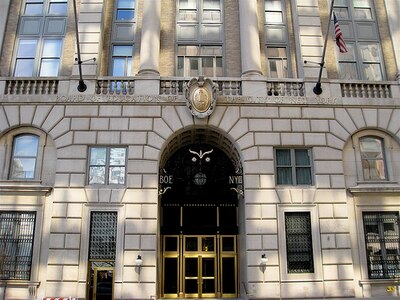
Earlier this month, I wrote about all the investigations into the Department of Education that happen every year but are never publicly reported. (In 2007, the Special Commissioner of Investigations into the DOE filed almost 300 reports that never became public knowledge.) A key to the reports’ remaining outside the spotlight: The only person besides the investigator who gets copies of them is the chancellor.
But it turns out that there’s another city group that might have the right to look at the reports: The Panel for Educational Policy, the 13-member group charged with voting on policy changes proposed by the chancellor.
The logic behind that possibility is buried inside the law that created the investigator in the first place, an executive order issued by Mayor David Dinkins in 1990. Here’s an excerpt from the order (PDF):
(e) The Deputy Commissioner shall, at the conclusion of any investigation that results in a written report or statement of findings, provide a copy of the report or statement to the Commissioner of Investigation, Chancellor, and the Board of Education.
What’s the Board of Education in an age of mayoral control? When the mayor first sought control of the schools in 2002, many pushed for the state legislature to abolish the board altogether. But at least one author of the law, Steve Sanders, who was then the chair of the Assembly’s education committee, resisted, and the board was maintained. (“The board of education of the city school district of the city of New York is hereby continued,” is the first sentence of the law.) The reason the word “board” hasn’t been spoken much lately is that, while it still exists, the Bloomberg administration gave it a new name: The Panel for Educational Policy. (See the PEP’s bylaws (PDF) for more on that.)
Does that mean that the PEP should receive reports from the Special Commissioner of Investigations?
The city law department’s position is that it should not. “The Panel for Educational Policy is not entitled to receive written reports or statements of findings issued by the Office of the Special Commissioner of Investigation,” a spokeswoman for the department said in a statement. She said the decision was based on a section of city law that defines the board as having a purely advisory role on policy matters and no executive or administrative powers.
Others disagree. Sanders, who is now working as a lobbyist for the state school boards association, which is fighting to amend the mayoral control law, told me that he thinks the reports should be sent to the PEP. “To make the judgment that the SCI no longer has to make reports to the Board of Education is at best a real stretch of the intention of the law and at worst I think a conscious circumvention of the law,” said Sanders.
Sanders also denounced the administration’s decision to re-name the Board of Education the PEP:
“I almost fear that the mayor and the chancellor have been using certain terms so long, they actually believe that those terms exist, which they don’t. There is no Panel on Educational Policy; there is a Board of Education. That’s in law. The title Panel on Educational Policy is made up. It doesn’t exist in law.”
Update: I originally attributed the city’s decision on whether the PEP should receive SCI reports to the Department of Education, whose spokesman sent me the statement. But the statement actually originated from the city law department.
